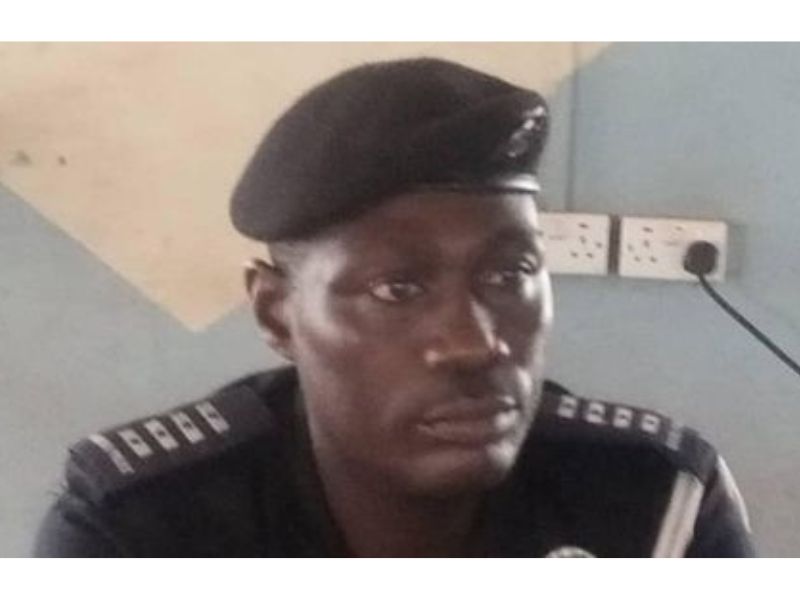
The Station Officer at the Drobo Police Station, Chief Inspector Mark Kwabena Okyere, says any suspect had the constitutional and human rights to demand reasons for his or her arrest. He, however, reminded the public that the police also had every right to use any reasonable force to apprehend suspects who attempt to resist arrest.
Chief Insp. Okyere said this when he was speaking at a sensitisation forum on the Justice Sector Support (JSS) Activity of the Ghana Case Tracking System (CTS), held at Babianeha, near Drobo in the Jaman South District of the Bono Region.
The Commonwealth Human Rights Initiative (CHRI), a Non-Governmental Organisation (NGO), with support from MIHOSO International Foundation, its local partners, organised the forum to sensitise the community on the CTS and the JSS Activity.
Chief Insp. Okyere reminded the public that “any bailable offence does not attract fees or charges, but free instead,” and added, “it is the responsibility of the police to grant suspects bail whether the complainant is around or not around”.
He emphasised that the police have discretionary powers to either invite or arrest a suspect depending on the level of the offence, and warned the public against meting instant justices on suspects, saying those who do so would also be arrested and prosecuted as well.
The Programmes Director of MIHOSO International and Coordinator of the CTS, Mr Thomas Benarkuu, indicated that access to justice remain a fundamental human right everybody must enjoy.
He however expressed worry that many Ghanaians are denied access to justice because of the lack of knowledge on the country’s justice delivery system, hence the need to sensitize and empower the populace to understand their rights.
The Chief of Babianeha, Nana Takyi Tuah, lauded the JSS Activity and the CTS, and expressed the hope that the NGO, CHRI and its funding partners would extend and sustain the project for the benefit of the majority of the populace. The CTS, is an integrated software that tracks criminal cases in the justice delivery system from its inception until their disposition.
Funded by the United States Agency for International Development (USAID), the government launched the CTS in 2018 to provide information about criminal cases at every stage in the justice delivery system.
Since then, the system has been set up in the six key justice sector institutions, including the Ghana Police Service, Economic and Organised Crime Unit (EOCO), the Attorney General, Legal Aid Commission, Judicial Service to track cases.
But, the CHRI says it is unhappy about implementation of the CTS so far, and called on the government and stakeholders in the sector to help tackle the challenges impeding the system’s implementation in the country.
ABOUT ARRESTS
Article 14(2) of the 1992 Ghana Constitution states that “A person who is arrested, restricted or detained shall be informed immediately, in a language that he understands, of the reasons for his arrest, restriction or detention and of his right to a lawyer of his choice;
(3) A person who is arrested, restricted or detained – (a) for the purpose of bringing him before a court in execution of an order of a court; or (b) upon reasonable suspicion of his having committed or being about to commit a criminal offence under the laws of Ghana, and who is not released, shall be brought before a court within forty-eight hours after the arrest, restriction or detention;(4) Where a person arrested, restricted or detained under paragraph (a) or (b) of clause (3) of this article is not tried within a reasonable time, then, without prejudice to any further proceedings that may be brought against him, he shall be released wither unconditionally or upon reasonable conditions, including in particular, conditions reasonably necessary to ensure that he appears at a later date for trial or for proceedings preliminary to trial. (5) A person who is unlawfully arrested, restricted or detained by any other person shall be entitled to compensation from that other person.”
Article 15 of the Constitution explains that (1) “the dignity of all persons shall be inviolable [that] (2) No person shall, whether or not he is arrested, restricted or retained, be subjected to – (a) torture or other cruel, inhuman or degrading treatment or punishment; (b) any other condition that detracts or is likely to detract from his dignity and worth as a human being.” So, neither the police, the Bureau of the National Investigations (BNI) nor the public asserting our arrest have the law to abuse our civil rights or liberties?










